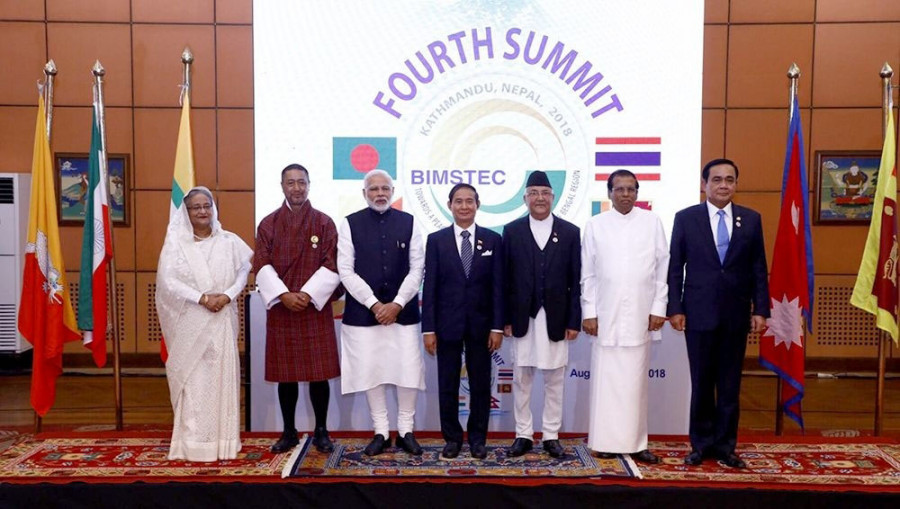National
Fifth summit of BIMSTEC uncertain amid Covid-19 pandemic
The scheduled meeting of the top leaders of the seven-nation regional group in Sri Lanka would have adopted a charter to help it move forward.
Anil Giri
The fate and the form of the Bay of Bengal Initiative for Multi-sectoral Technical and Economic Cooperation ( BIMSTEC) biennial summit in Sri Lanka is uncertain amid the Covid-19 pandemic.
The summit scheduled for September was expected to adopt a new charter.
Amid uncertainty regarding the summit, there have also been proposals to host the fifth summit virtually between September 10-15. The BIMSTEC meeting led by foreign secretaries of the seven member member nations on Wednesday could finalise the form and dates for the virtual summit.
“The meeting is also expected to give the final touches to the BIMSTEC charter which will be adopted at the summit,” said Shanker Das Bairagi, the foreign secretary, who is leading the Nepali delegation of the 21st senior officials.
More than two dozen BIMSTEC meetings between the seven member nations Nepal, Bangladesh, Bhutan, India, Myanmar, Sri Lanka and Thailand planned for 2020 could not take place due to the Covid-19 pandemic.
These meetings would have discussed the 14 areas of cooperation between the members.
India has been pushing to make the regional body, formed in 1997, more relevant as an alternative to the South Asian Association for Regional Cooperation (SAARC).
But BIMSTEC has been struggling to make much headway as five of its members—Nepal, India, Bhutan, Bangladesh and Sri Lanka—belong to SAARC while Thailand and Myanmar are part of the Association of South-East Asian Nations.
The regional body needs a new charter to make itself more relevant and so far it has been guided largely by the Bangkok Declaration of 1997. It is yet to agree on setting up various mechanisms while its secretariat has already been set up in Bangladesh.
Up to the fourth summit held in Nepal in 2018, BIMSTEC has been working on a Bangkok Declaration adopted in Bangkok in 1997.
Besides finalising the charter, the foreign secretary level meet will also finalise the date of Bimstec ministerial level meeting, finalise the text of rules of procedure of the regional body, develop a common template for establishing BIMSTEC centers, and announce a new secretary general from Bhutan, among others, according to Bairagi.
The two-day fourth meeting of the BIMSTEC permanent working committee for the spade work for the 21st senior official meeting on Wednesday began on Monday.
Despite the flurry of meetings, experts are divided over the evolution, development and future of the region body due to its sluggish progress.
“It neither has a relevant charter nor vision documents,” said Pradhumna Shah, a former ambassador. “A dedicated charter is a must for strengthening the regional body but BIMSTEC has failed to come up with an agreed text in the last 23 years.”
“If India wants to revive its good ties with its neighbours, there is no alternative to reviving SAARC.”
But SAARC is facing its own existential crisis because of the long-standing rivalry between India and Pakistan.
It has not been able to hold its 19th summit since Nepal hosted the 18th one in 2014. Pakistan was scheduled to host the 19th summit in November 2016 but, after an attack on Indian Army base in Jammu and Kashmir, India decided to withdraw from the summit accusing a cross-border terrorist outfit of carrying out the attack.
After India’s decision to pull out from the summit, other member states supported India's position and as a result the summit has been postponed indefinitely.
With the postponement of the summit in Pakistan, Nepal has become the longest serving chair of SAARC in its history.
“We should reinvigorate SAARC,” said Shah, who had earlier worked as director of the SAARC Secretariat and used to look after SAARC and Bimstec while serving at the Ministry of Foreign Affairs. “While BIMSTEC needs to go a long way because it has just a body and lacks life, funding, regional sentiments and projects, among others, SAARC, on the other hand, has some funds being channelled through the SAARC Development Fund that has several big and small projects going.”
Constantino Xavier, a fellow at Brookings India, a New Delhi based think tank is of a different view.
“Unlike SAARC, which has remained stalled because of Pakistani obstructionism and Indian hesitations, BIMSTEC is driven by like-minded states that share a vision for regional connectivity and stronger economic links with the Bay of Bengal and ASEAN regions,” Xavier said.
Holding a summit even if virtually in 2020 would reflect on the commitment to strengthen the organisation among all seven member states, Xavier said.
The Covid-19 pandemic has further exposed the need for stronger regional cooperation, whether to combat a virus or access export markets and build new supply chains across the region, according to Xavier.
“Smaller states like Nepal always have more to gain from strong regional institutions, which both China and India are sometimes reluctant about,” he said. “To attract FDI and access export markets, Nepal can benefit from BIMSTEC to connect with Myanmar, Thailand and other ASEAN economies,”
It is a view shared in Bhutan.
“Bhutan has always been supportive of regional groupings like BIMSTEC as it is an opportunity to improve connectivity and trade and also look towards the Bay of Bengal and South East Asia,” Tenzing Lamsang, editor of The Bhutanese, a Thimphu-based newspaper, who follows regional geo-politics said.
But Shah, the former ambassador, has another take.
“Some Indian experts say BIMSTEC is needed to bridge the gap between South Asia and South-East Asia”, he said. “India is doing over $ 100 billion trade with South-East Asian nations so why does it need BIMSTEC?”




 9.7°C Kathmandu
9.7°C Kathmandu














